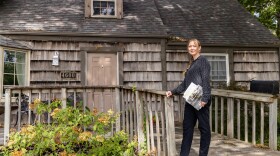“Those who do not remember the past are condemned to repeat it.”
Most people recognize some iteration of this phrase coined by Harvard philosopher George Santayana. It’s the same sentiment the nonprofit is trying to get across in their 2020 report:
DallasTRHT executive director Jerry Hawkins said the group is calling attention to the city’s sordid past, to help people better understand racial disparities and craft solutions to make Dallas a more equitable place to live.
“A lot of folks look at Dallas and they may see, you know, nice fun places to shop in Bishop Arts or hang out in Deep Ellum,” Hawkins said. “But those communities have a long and storied history, and all of them are not so fun. So it's really important for us to know where we come from.”
The group released its annual report last week, referencing a few specific examples of the city’s racist past — like in the 1920s when Dallas had the highest number of Ku Klux Klan members per capita in the entire country.
Michael Phillips, a historian at Collin College, wrote about that in his book ."
"The Ku Klux Klan ran Dallas, and it became the epicenter of the movement," Phillips wrote.
Nearly a century later, The Urban Institute published a study ranking some of the largest U.S. cities based on their . Dallas was ranked 272 out of 274 cities.
"What we are doing to avoid talking about the history or the more painful past is actually putting [people] at a disadvantage, because we’re not getting that full comprehensive view of our history and our place in it."Stephanie Drenka, DallasTRHT Communications Director
Hawkins said the organization hopes people will connect to the stories in the report, and develop a deeper understanding of racial issues when looking at them through the historic lens.
“What we are doing to avoid talking about the history or the more painful past is actually putting [people] at a disadvantage,” said DallasTRHT communications director Stephanie Drenka. “Because we’re not getting that full comprehensive view of our history and our place in it.”
Drenka said those with the most power in society are the only ones who benefit when the darkest parts of history are left unaddressed.
“Because learning about history, we learn how they came to that power and how they maintain it,” she said. “It’s at a cost, and it’s mostly due to racism.”
But the work by DallasTRHT does not stop here. Two years ago, the organization launched the to provide organizations with training, information sharing, policy review and development for a more racially equitable workplace.
“We wanted to focus on institutional racism and decrease the harm that organizations create in their communities and in their own organizations,” Hawkins said. “And move them closer to racial equity by...helping them learn about the racial history of Dallas, racial healing that can take place in communities, and also have them do very tangible policy and practice change work in their organization.”
Dallas TRHT is funding up to $10,000 for nonprofit groups to create a project or program that will become, in some cases, very transformational to organizations, Hawkins said.
Applications for the are now open.
�Ļ�ӰԺ is a participant in the Dallas Truth, Racial Healing & Transformation 2021 cohort.
�Ļ�ӰԺ is made possible through the generosity of our members. If you find this reporting valuable, consider making a tax-deductible gift today. Thank you.
Got a tip? Email Rebekah Morr at rmorr@kera.org. You can follow her on Twitter @bekah_morr.





